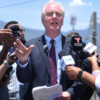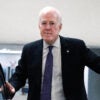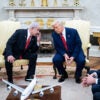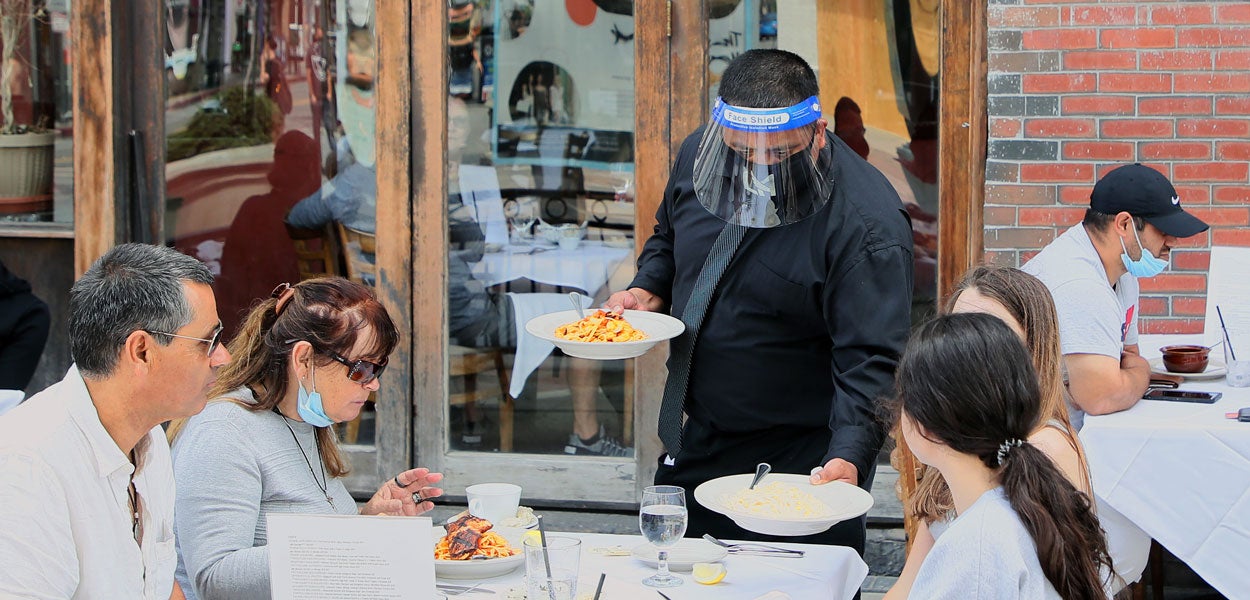As the country attempts to reopen amid the continuing COVID-19 pandemic, one easy way we can help reduce the spread of the disease is using face masks. But policymakers—such as those in California and in some cities—are exactly wrong to mandate them.
Policymakers and public health officials should encourage the use of masks, but should absolutely avoid mandating them.
Mandating mask use could turn this lightweight solution into yet another onerous burden on the American people during the pandemic response.
The Daily Signal depends on the support of readers like you. Donate now
>>> What’s the best way for America to reopen and return to business? The National Coronavirus Recovery Commission, a project of The Heritage Foundation, assembled America’s top thinkers to figure that out. So far, it has made more than 260 recommendations. Learn more here.
A broad, untargeted mandate, and its requisite enforcement, will end up punishing Americans for violations of a public health measure in many situations that have zero public health implications.
It’s important here to distinguish government from private businesses, which are well within their rights to implement mask requirements to patronize their shops and stores. In fact, it’s prudent to do so in businesses that require prolonged close contact, such as salons or retail stores.
One of the major missteps in the early pandemic response was public health messaging that stated that face masks were not effective in preventing disease, and the general public was encouraged not to purchase surgical masks for themselves.
No less than Dr. Anthony Fauci recently admitted that this early messaging was meant not to protect the public, but rather to preserve the supply of masks for health care providers.
That goal of ensuring provider access to protective equipment is laudable, but Americans from the start should have been trusted with clear, concise, and transparent information and messaging, and trusted to act accordingly.
That’s the only way to build trust and cooperation with the public, especially on such a simple measure as wearing a face mask.
That said, as a doctor, I encourage Americans not to dismiss using face masks. Increased testing throughout the country has shown that, even after a month or more of multiple statewide lockdown orders, tens of thousands of new cases still occur daily.
Because of how fast the disease spreads, preventing its transmission requires a multitude of measures. But they need to be appropriate and balanced.
The time is over for harsh measures—such as stay-at-home orders, which forbade most Americans from going to work, from attending church services, from going to bars and restaurants, and from otherwise participating in normal activities that make us feel like normal human beings.
Those measures were enacted to stanch the exponential spread of the virus, but because of their heavy-handed nature were never realistic long-term solutions.
A much less burdensome solution, then, is necessary to continue fighting the virus while resuming some parts of normal daily life. The use of face masks is a solution that has very low cost and a light imposition on the lives of individual Americans.
Even if they aren’t showing symptoms, masks will let more Americans go out and resume more normal lives. We know that masks are an easy way of reducing transmission of COVID-19 in confined or indoor spaces, but otherwise have little effect in outdoor open spaces.
For instance, their use is not necessary in areas with little close contact, such as driving alone in your car or walking on an uncrowded biking trail.
Americans should want to choose to wear them—at the right time and in the right places—because they will help us interact in safer ways with vulnerable people at high risk of dying from the disease (e.g., the elderly and those with certain underlying medical conditions).
So, for example, wearing a mask means that we are taking steps to help our grandparents be—and feel—safe going out in public.
COVID-19 spreads by breathing out, and—based on the best information we have now—putting a physical barrier of any sort in the path of a person’s respiratory expulsion limits the travel and spread of that expulsion.
That’s the reason surgeons wear masks during procedures. It’s not to protect the mask-wearing surgeon, but to protect the patient from the surgeon’s respiratory particles.
Of course, if you’re sick, you still need to stay home. Regular cloth masks, and even surgical masks, do not stop transmission of the disease.
We also need to be clear-eyed about the reliability and limitations of this information. Current evidence with regard to face masks and COVID-19 is largely sparse, and guidance to wear masks is based on clinical experience and data from prior experiments with similar viruses.
That doesn’t mean we should to wait to wear masks until we have hard evidence in a randomized, controlled trial. That would throw out commonsense in pursuit of evidence-based policy and needlessly impede the public health effort to prevent the spread of disease.
At the same time, it also means policymakers must have great humility with regard to mask-wearing policies.
The restrictive lockdown measures were a heavy burden on the American people, and policymakers must not turn mask-wearing into a similarly heavy burden with mandates and enforcement. The mask-wearing mandates are already resulting in reflexive defiance and can further undermine the already tenuous and increasingly shaky trust that public health officials hold with the public.
Masks right now appear to be a highly effective, low-cost measure in the fight against COVID-19. Everyone should consider that, but lawmakers must not ruin it.






























